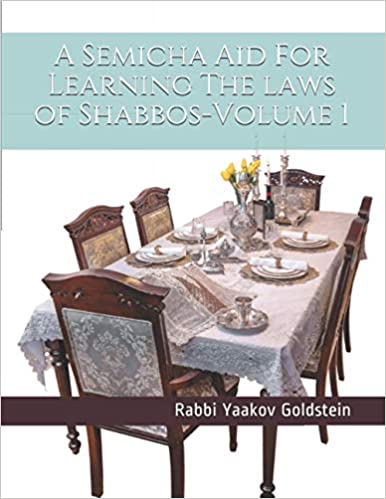

To purchase this Sefer, click here
6. Is food that had a transgression done to it on behalf of an ill person allowed to be eaten by others?[1]
Eating from meat of an animal permissibly slaughtered on Shabbos: One who slaughters on Shabbos on behalf of a deathly ill person, it is permitted for a healthy person to eat from this meat while raw. One is to eat it without salting it [for blood] but rather with merely rinsing it alone, as is explained in Yora Deia chapter 67 [Halacha 2][2], because it is forbidden to salt on Shabbos as will be explained in chapter 321 [Halacha 2]. It is forbidden to eat from meat of an animal that was slaughtered on shabbos, even if it was done due to pikuach nefesh. [Furthermore] even if the sick person received his illness today [on Shabbos] and [thus] yesterday [before Shabbos] he did not have in mind at all to slaughter [the animal] today [on Shabbos], nevertheless it does not contain [the] Muktzah [prohibition], for the reason explained in chapter 310 [Halacha 6].
Eating from food cooked or that had done to it any other forbidden action on behalf of an ill person: However, one who cooks, or does another type of [forbidden] action for a deathly ill person, then it is forbidden [for that cooked food to be eaten] on Shabbos by a healthy person or by [even] a sick person who is not deathly ill.
The reason for why one may not eat from the cooked food is: due to a decree that [if he were allowed to eat from it then] he may come to add [meat] for himself to the [forbidden] action [being done].[3] However, by slaughtering, adding [more to the action being done] on behalf of a healthy person is not relevant, as it is not possible to [obtain] a Kezayis[4] of meat that one needs for the sick person without slaughtering the entire animal.
The law when a gentile did a forbidden action to the food on behalf of an ill person: [Furthermore] even if one did [the forbidden action of cooking and the like] through a gentile, whether it was done on behalf of a deathly ill person [or] whether on behalf of a sick person who is not deathly ill, it is forbidden for a healthy person [to partake in that food] on Shabbos, due to a decree that [if he were allowed to partake in it] perhaps he may [tell the gentile] to add [more food] on his behalf.
However, after Shabbos it is allowed [to be eaten] by a healthy person immediately, and he does not have to wait the amount of time after Shabbos that it would have taken to cook it being that the gentile which did [the forbidden action to the food] was permitted [to be told to do so being that it was] for the need of a sick person.
If the gentile cooked or baked the food: However this [allowance to eat the food after Shabbos] only refers to [when] other [forbidden] actions [were done to the food on Shabbos by the gentile] with exception to baking and cooking, as if a gentile baked or cooked on Shabbos for the need of a sick person, then it is forbidden for a healthy person even after Shabbos due to it containing [the prohibition of eating] food cooked by a gentile, as will be explained in Yorah Deiya chapter 113 [Halacha 1].[5]
__________________________________________________________
[1] Admur 318:5
[2] There it explains that one is allowed to eat raw meat without removing its blood being that the blood prohibition only applies to blood that has left the flesh of the animal. Nevertheless, one is still obligated to wash the meat prior to eating being that there is blood that has separated on its surface.
[3] Meaning he may come to add an extra piece of meat to the pot that he is cooking for the ill person in order so he too can have a piece, in which case he has done a Biblical prohibited action of cooking. Thus, the Sages decree against him eating at all from any of the cooked meat even if it was cooked solely for the ill person.
[4] 27 grams.
[5] This follows the ruling of the Taz in Yorah Deah 113:15, and so rules also Beir Heiytiv [there 19] and other Achronim. To note that the Beir Heiytiv even mentions that it should be forbidden for the sick person after Shabbos, however from Admur it is implied that it is still allowed for the sick person.
However, the Rama [Yorah Deah 113 Halacha 16] and Shach [in Nekudos Hakesef there in 113] Mishneh Berurah [318:14] and Gra rule that it is permitted to be eaten by a healthy person even when cooked, as since it was done permissibly the Sages never made a decree here of “cooked foods of Gentiles”.


Leave A Comment?
You must be logged in to post a comment.